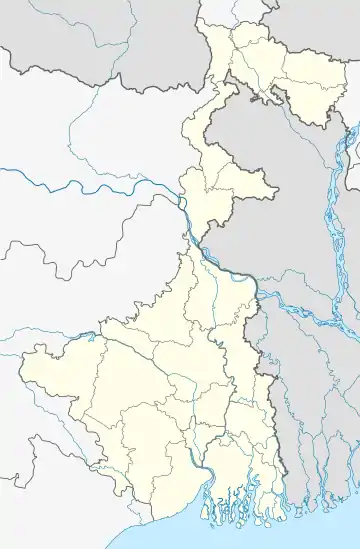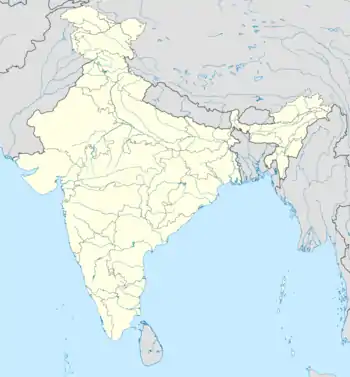Andaranfulbari
Andaranfulbari (also spelled Andaran Phulbari) is a village and a gram panchayat in the Tufanganj I CD block in the Tufanganj subdivision of the Cooch Behar district in West Bengal, India
Andaranfulbari | |
|---|---|
Village | |
 Andaranfulbari Location in West Bengal, India  Andaranfulbari Andaranfulbari (India) | |
| Coordinates: 26.3345°N 89.6599°E | |
| Country | |
| State | West Bengal |
| District | Cooch Behar |
| Population (2011) | |
| • Total | 18,261 |
| Time zone | UTC+5:30 (IST) |
| PIN | 736160 |
| Telephone/STD code | 03582 |
| Vehicle registration | WB |
| Lok Sabha constituency | Cooch Behar, Alipurduars |
| Vidhan Sabha constituency | Natabari, Tufanganj |
| Website | coochbehar |
Geography
| Places in the Tufanganj and Dinhata subdivisions (except Sitai CD block) in Cooch Behar district CT: census town, M: municipal town, R: rural/ urban centre, H: historical/ religious centre Owing to space constraints in the small map, the actual locations in a larger map may vary slightly |
Location
Andaranfubari is located at 26.3345°N 89.6599°E.
Andaranfulbari I and Andaranfulbari II are gram panchayats in the Tufanganj I CD block.[1]
Area overview
The map alongside shows the eastern part of the district. In Tufanganj subdivision 6.97% of the population lives in the urban areas and 93.02% lives in the rural areas. In Dinhata subdivision 5.98% of the population lives in the urban areas and 94.02% lives in the urban areas.[2]The entire district forms the flat alluvial flood plains of mighty rivers.[3]
Note: The map alongside presents some of the notable locations in the subdivisions. All places marked in the map are linked in the larger full screen map.
Demographics
As per the 2011 Census of India, Andaran Phulbari had a total population of 18,261. There were 9,445 (52%) males and 8,816 (48%) females. There were 1,725 persons in the age range of 0 to 6 years. The total number of literate people in Andaran Phulbari was 12,820 (77.53% of the population over 6 years).[4]
Historical ruins
The ruins of an old fort, known as Chilarair Kot, are located here. Sukladwaj or Chilarai, (1510-1571), younger brother of Nara Narayan, of the Koch dynasty, had established the fort.[5]
According to historian Harendranth Chowdhury, Chilarai used to live in a wood or bamboo built complex in the fort that was well protected by high walls. Possibly it earlier was a mecha ghar, a temporary structure built of wood or bamboo, for the purpose of engaging in warfare, in the 16-17th century, close to a highway. Chilarai had built several such mecha ghars along the road to Assam for use in warfare against the king of Assam. Chilarai was very fond of the mecha ghar at Andaran Fulbari, on the banks of the Raidak River. It is said that the name of the place earlier was only Fulbari, and the prefix was added because the fort housed the andar mahal (family quarters) of Chilarai.[5]
There is no trace of the structures built of wood or bamboo, but the remains of the surrounding protection walls are still there. The earthen surrounding walls were strengthened at the base with lime and brickbats. At present it is 7 feet high and 6 feet wide, but it is believed to have been higher in the earlier days. In the north and south it is 270 feet long, and on the east and west it is 210 feet long. There is a 5 feet gap in the east, which possibly was the entrance. The andar mahal probably had a separate entrance. The land inside the fort measures 56,700 square feet (5,270 m2).[5]
Chilarai had once hidden the Assamese Vaishnavism preacher Sankardev in his fort, to protect him from the wrath of his elder brother, Nara Narayan. Chilarai was possibly influenced by the sage at Andaran Fulbari and later converted to Vaishnavism. It may be mentioned here that although Narayana was the family deity of the Koch dynasty they followed Shaktism and were worshippers of goddess Kamteswari.[5]
The ruins of another fort, known as Chilarair Bara Kot, is there at Kamat Phulbari, 2.4 kilometres (1.5 mi) away.[5]
References
- "Directory of District, Subdivision, Panchayat Samiti/ Block and Gram Panchayats in West Bengal". Cooch Behar. Retrieved 3 August 2020.
- "District Statistical Handbook 2013 Cooch Behar". Tables 2.2, 2.4b. Department of Planning and Statistics, Government of West Bengal. Archived from the original on 21 January 2019. Retrieved 5 August 2020.
- "District Census Handbook, Koch Bihar, Series 20, Part XIIA" (PDF). Census of India 2011, pages 17-21 Physical feafures. Directorate of Census Operations, West Bengal. Retrieved 5 August 2020.
- "C.D. Block Wise Primary Census Abstract Data(PCA)". West Bengal – District-wise CD Blocks. Registrar General and Census Commissioner, India. Retrieved 3 August 2020.
- Koch Bihar Jelar Purakirti (in Bengali), Data compilation and writing by Dr. Shyamachand Mukhopadhayay, published by the Department of Archaeology, Government of West Bengal, Second edition 1974, Pages 26-28.
